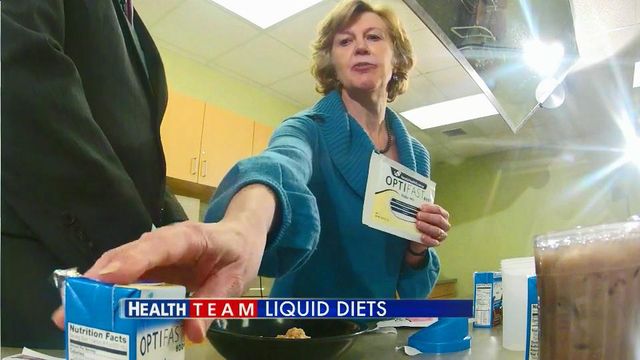Magic bullet? No, but liquid diets can help weight-loss weary
Doctors say they hear it all the time from patients, "How can I lose weight fast?" While there is "no magic bullet," according to Dr. Ronald Sha, liquid diets can help speed up the weight-loss process for some people.
Posted — UpdatedSha, who works as the medical director at the Duke Diet & Fitness Center in Durham, says the program isn’t for everyone.
“Most people for just general weight loss, they'll cut back on their calories by around 500 calories a day, for a loss of about a pound a week or so,” he said. “(This program) is more for people who have put in a lot of effort in losing weight with other diets and simply haven't been successful.”
“If you go below the minimum calories recommended per day, there can be significant risks, including headache, dizziness, nausea, hair loss and muscle loss. If you go way below that, for example, to 500 calories or less per day, there can be significant risks, including anemia, stroke or heart arrhythmias,” said Dr. Allen Mask, WRAL’s Health Team physician.
'I want something quick and simple and easy'
The OPTIFAST program involves five meals a day, with shakes and soups. Each meal has 160 calories, 20 grams of carbohydrates and 14 grams of protein.
“We also recommend a bar. It’s nice to chew something, because on a liquid diet program, you’re not going to chew very much,” said Elisabetta Politi, a registered dietitian at the Duke Diet & Fitness Center. “The diet will be pretty low in sodium and could lower your blood pressure, and it could make you dizzy and light-headed. We do recommend a soup, and the soup has 600 milligrams of sodium.”
Patients are encouraged to eat more frequently, usually at 8 a.m., 11 a.m., 2 p.m. and 5 p.m. and then eat a bar for a snack after dinner. They can also drink water, unsweetened tea and coffee and diet sodas.
“Of course when we tell clients that this is what they’re going to eat, they always worry, ‘Oh, I’m going to be starving.’ And after a week of doing so, they come back to us and say, ‘I have not been hungry at all,’” Politi said.
Meal replacements are useful, Politi says, because they help people become more aware of calories.
That was the case with Ginger Anderson, 53, who signed up for Duke’s program after speaking with her doctor and sharing her weight-loss struggles. Although she successfully lost weight when she was younger and maintained it for seven years, she struggled as she got older.
“I got married in my late 30s and then had two children by the time I was 40, so that threw me for a loop,” she said. “Anytime it seems like I have a really big life change, you know, I just gain weight.”
Anderson, who has diabetes and high blood pressure, told her doctor she was considering surgery, but he recommended the OPTIFAST program.
“I said, ‘Well, I probably would rather do that (than surgery), but I want something quick and simple and easy,’ so that’s one of the reasons I went (to Duke),” she said.
Anderson decided to do the 18-week program. She opted not to stay at the health center, since she lives within driving distance. Instead, she traveled to Duke once a week for education sessions and checkups with a doctor. The program helped her shed 42 pounds.
“The group support was very, very helpful, and the products were very good. The only thing that I really did not like at all was the tomato soup. It was terrible,” she said. “One fear I had about it is that I would be hungry, and I really wasn't.”
Doctors decry celebrity-inspired liquid diets
The program’s goal is to help patients transition to a normal food diet, and participants have access to behavioral specialists, nutrition and fitness experts and physicians. Having that support is key, especially when doing a low-calorie diet, doctors say.
Ron Bowling, 56, of Arizona, learned that the hard way. He tried a liquid diet program with minimal doctor supervision and lost a lot of weight, but said he quickly gained it back, plus some, once he returned to solid food.
“There was no education, no coaching at all in it,” he said.
Bowling decided to travel to Durham and participate in the Duke Diet & Fitness Center’s residential program.
“The meals are very satisfying,” he said.
For slower weight loss with more calories, a modified liquid diet is an option for some. A shake could replace one or two meals, followed by a healthy, solid-food dinner. Doctors urge people to avoid celebrity-inspired liquid diets, such as the one Beyoncé used.
“That diet is simply lemon juice, maple syrup and cayenne pepper,” Mask said. “There's no solid research to back it up, and it's not medically recommended. Anything like that should be very short-term, no more than two days.”
A medically prescribed liquid diet, on the other hand, is typically used for people who need to lose weight before bariatric surgery or have health concerns, such as diabetes and high blood pressure.
• Credits
Copyright 2024 by Capitol Broadcasting Company. All rights reserved. This material may not be published, broadcast, rewritten or redistributed.






